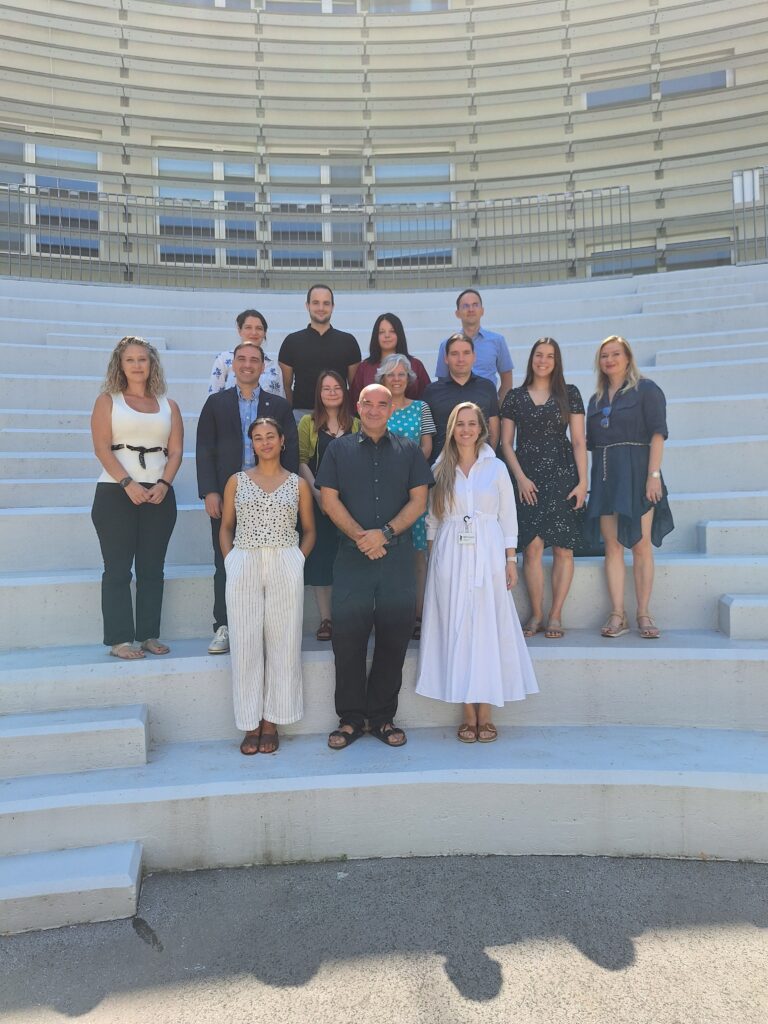Highlights from SynHealth’s First Consortium Meeting in Zagreb – Day one
SynHealth Unites in Zagreb: Our First In-Person Consortium Meeting
The SynHealth project successfully held its first in-person consortium meeting and workshop in Zagreb, Croatia during the first week of July. The two-day event brought together our dedicated team and invited experts, all focused on advancing preventive medicine through research and collaboration.
Day 1: Deep Dives into Science and Strategy
The first day was packed with insightful sessions designed not only to equip PhD students, early-career researchers, but also to provide the consortium with a comprehensive 360-degree view of achieved milestones and upcoming activities.
CV and interview essentials
The meeting kicked off with a practical lecture from Marianna Bevova (University of Luxembourg). She shared invaluable advice on maximizing chances for PhD students and early-career researchers in the life sciences. Around 24 attendees and 15 consortium members gained insights into common pitfalls to avoid, how to enhance CV portfolios, and strategies for navigating the administrative and pragmatic aspects of entering the academic ecosystem.
Polygenic Risk Scores
Next, Arina Nostaeva (University of Liège) provided a detailed overview on polygenic risk scores, GWAS (Genome-Wide Association Studies), and the build of individual profiles (SNP associations). Aimed at advanced students and early-career researchers, the presentation used numerous examples to illustrate the application of genetic research techniques in de-risking and observing risk trajectories for diseases like cancer.
Glycan Biomarkers in Personalized Medicine
The afternoon began with Coordinator Gordan Lauc (Genos Ltd), who shed light on personalized medicine and how to approach it beyond genetics. Dr. Lauc introduced glycans as the ultimate layer of molecular complexity, with over 250,000 glycans already studied globally. He explained how glycome composition differs significantly between individuals and how IgG glycans change remarkably with age, making glycome composition an excellent biomarker for chronological and biological age. The session also described GlycanAge, a test based on inflammation-regulating molecules.
Autoantibody Profiling in Systemic Lupus Erythematosus
Ioannis Parodis (Karolinska Institutet) addressed the challenges of homogeneous treatment in systemic lupus erythematosus (SLE), noting that a “one size fits all” approach often results in only a 50% response rate. He explored the similarities in inflammation across various diseases and health states, emphasizing the high heterogeneity of systemic autoimmune diseases. The discussion delved into whether clusters can predict treatment response and how autoantibodies relate to SLE activity.
Lifestyle and Biological Age: Monitoring Changes with GlycanAge Index
Lucija Gosak (University of Maribor) closed the open sessions with a presentation on monitoring changes in lifestyle and biological age using the GlycanAge Index. She detailed the methodology for gathering health status data among intervention groups and compared Glycan Age with a Lifestyle score (HLPCQ).
Work Package Presentations: First Outcomes Unveiled
The first day concluded with dedicated Work Package (WP) presentations from the SynHealth consortium members. This session was exclusively for the consortium, allowing partners to present their work in depth, unveil initial outcomes, discuss challenges, potential pivots, and upcoming tasks.
-
Demonstration of person-centred AI model for personalised interpretation of glycan biomarker data presented by Gregor Štiglić (University of Maribor).
-
Valorisation studies of Horizon results (glycan biomarkers) presented by Azra Frkatović-Hodžić (Genos Ltd).
-
Demonstration of the adoption of glycan biomarkers for personalised preventive healthcare in real-world setting presented by Sofia Shkunnikova (GlycanAge).
-
Preparation of proposals for ERDF funding presented by Coordinator Gordan Lauc (Genos Ltd).
-
Building capacity for innovation, innovation management and knowledge transfer presented by Filipa Sousa (F6S).
-
Communication and dissemination presented by Tiphaine Vigniel (F6S).
-
Project management presented by Ivana Gulišija (Genos).
Stay tuned for our second day in Zagreb: workshop day!
The SynHealth project, funded under the Horizon Europe WIDERA program, is pioneering advancements in preventive healthcare through cutting-edge glycan biomarker research.
- Terms: #biomarkers, #healthcare, #innovation, #tech, #workshop, event, Glycans, Zagreb
Register to our newsletter!
Don’t miss insights, news and events by signing up!
